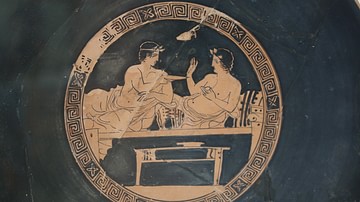In this collection, we examine one of the greatest contributions made by the ancient Greeks to world culture: their systems of government and, above all, the ideas of democracy and mass participation in politics. We also consider the society which created these institutions and the roles different people played or did not play in everyday politics and social life. From the jury system to the symposium, ostracism to slavery, the individual polis to the international leagues of cooperation and empire, we look at how the Greeks governed themselves and consider how they both unified and divided themselves in the public and private arenas.
The word democracy (dēmokratia) derives from dēmos, which refers to the entire citizen body, and kratos, meaning rule. Any male citizen could, then, participate in the main democratic body of Athens, the assembly (ekklēsia). In the 4th and 5th centuries BCE the male citizen population of Athens ranged from 30,000 to 60,000 depending on the period. The assembly met at least once a month, more likely two or three times, on the Pnyx hill in a dedicated space which could accommodate around 6000 citizens. Any citizen could speak to the assembly and vote on decisions by simply holding up their hands. The majority won the day and the decision was final.











